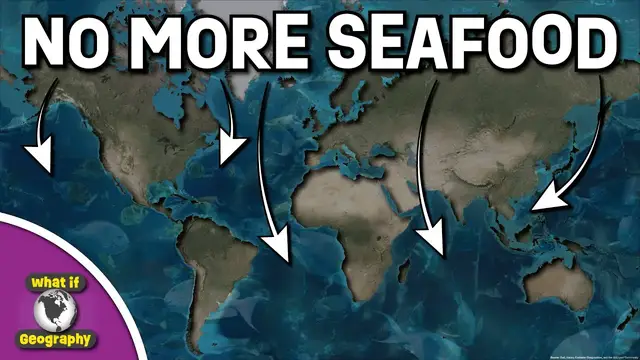The oceans often feel limitless along with the resources it provides. Unfortunately, that is not the case. Our global fisheries are over fished and over exploited to the point where we are running into a very real scenario where the oceans have been depleted. Some areas are already depleted forcing countries such as China to search well beyond their waters for additional sources of fish. So what if our fisheries collapse entirely?
Show More Show Less View Video Transcript
0:00
The oceans feed a huge amount of people. Humans have been fishing for thousands of years because
0:04
it has been a consistent and reliable source of food for basically everyone. Today, as human
0:09
populations boom around the world, the appetite for seafood has grown exponentially to the point
0:15
where we're running out of fish. So what if fisheries around the world collapse entirely
0:24
Hello and welcome to What If Geography, where we try and answer the great geographic what if
0:29
questions of the world. I'm your host Jeff Gibson and today we're diving into the Great Big Blue to
0:35
explore the worldwide fishing industry. It's a deep subject and we've got a lot to wade through
0:41
so let's dive in. But before we get to today's subject, as a reminder, this Wednesday is the
0:47
premiere of the What If Geography podcast. Join me and Professor Hunter Shoei as we take a much
0:53
deeper look at the southwest water issues. You can find each new podcast right here on YouTube
0:58
Spotify, Apple Podcasts, or wherever you find your podcasts. And of course, you can follow all things What If Geography on our official Twitter account
1:08
All links are in the description below. People have been harvesting fish and other seafood for at least the last 10,000 years
1:20
In fact, scientific tests show evidence that an ancient civilization in East Asia
1:25
was harvesting freshwater fish as far back as 40,000 years ago. Suffice it to say, fishing has been a source of food for humans for a long time
1:34
And it makes sense too. Oceans, rivers, and lakes are teeming with animal life
1:40
While there's still much to be discovered about our oceans, current estimates put the oceans at having somewhere around 78% of all animal life
1:48
This would include fish, whales, sharks, octopi, and so on. For ancient civilizations that lived near the ocean or a large body of water
1:56
it made sense to harvest food from it. And all of this was generally fine
2:00
At this level of fishing, the oceans can manage and fisheries can replenish with abundance
2:05
Fast forward to modern history and we start to see a change in how humans have been able to fish
2:09
You see, historically, fishing was naturally limited by the available technology at the time
2:15
And this can really be broken out into three categories. 1. The tools used for fishing at the time, which were crude fishing poles, fishing spears, and fishing nets
2:24
These tools limited the amount of fish a boat or ship could physically capture within a given period of time
2:30
After all even if you did manage to capture hundreds or thousands of fish within a single net it was very hard to lift those fish onto a boat with nothing but manpower and maybe a simple pulley system Two the method of propulsion prior to the Industrial Revolution
2:43
limited how far a fishing boat could go in search of new fish. Prior to the invention of steam and internal combustion engines
2:50
going even 100 miles off the coast in order to search for fish was a huge challenge
2:55
This effectively made 99% of the world's oceans relatively untouched. And three, storing fish during a long journey was basically impossible unless you salted
3:06
dried, or fermented them. This was fine for certain populations, such as sailors, but it wasn't very appealing
3:13
to most people on land who craved fresh fish. Refrigeration, invented in the 1900s, provided a method to capture and store thousands of
3:21
fish for much longer periods of time. As of the early 2000s, it was estimated that about a third of the world's fisheries were
3:27
overexploited, meaning that they are not replenishing at a fast enough rate to be sustainable
3:33
Large fish, in particular, are estimated to have been reduced to a fraction of their former
3:37
populations. In 2017, the World Bank stated that about 90% of the world's marine fish stocks were
3:43
either fully exploited or overfished. But even beyond directly fishing, our habit of using the
3:49
oceans as a landfill and stuffing the atmosphere full of carbon dioxide is having a deleterious
3:55
effect on the world's fish as well. Plastic is now found in basically all forms of life
4:00
but mostly in fish and other ocean critters. Oil spills have decimated entire populations of sea
4:05
life. And a heating world has begun the process of ocean acidification which is threatening the
4:11
biodiversity of the ocean. All that's to say, we are not taking care of our oceans very well at all
4:17
All of this technology has enabled humans to harvest more fish in regions farther away
4:22
on larger vessels and keep them refrigerated for much longer periods of time
4:27
And while at one point, the world's fish seemed limitless, we're now at the breaking point
4:33
In the not-too-distant future, we could very well see global fisheries collapse
4:37
and that will have huge ramifications for the world at large. But before we get into what a world without seafood would look like
4:44
if you're enjoying this video, now would be a great time to subscribe
4:48
More fun what-if geography videos are just a single click away. It's important to note that you will not wake up one morning and, all of a sudden, every
5:01
fish in the ocean will be gone. Global fisheries collapse does not mean that there will be no
5:05
more fish or sea life in the oceans though climate change certainly endangers all wildlife A scenario where global fisheries collapse simply means that we are no longer able to feed ourselves through fish and seafood Life in the oceans would be severely depleted but not gone entirely
5:21
That said, a world where we aren't able to get as much of our food from the oceans
5:25
will have a huge implication for the rest of the world. Because while it's certainly possible to get all of our necessary protein from plant resources
5:33
it's much harder to gain without the right combinations of foods. Seafood, in particular, is high in amino acids
5:40
which makes for a relatively cheap and easy method of protein that doesn't require the right combination of specific plants to get the same benefits
5:48
More to that point, seafood accounts for a significant source of protein for many countries around the world
5:54
Globally, somewhere around 17% of our animal protein comes from seafood, but that's not distributed equally
6:01
Some countries rely far more heavily on seafood than others. It accounts for more than 70% of the animal protein in Cambodia, 60% in Bangladesh and the Maldives, and more than half in Gambia and Sri Lanka
6:14
Japan and South Korea also get a significant source of protein from seafood
6:18
And while it's not a majority of their animal protein, China gets over 25% of its animal protein from seafood
6:24
For a country of 1.4 billion people, they need a lot of fish
6:29
And as such, they need to harvest a lot of fish from their own region and well beyond
6:38
Faced with the collapse of large fish populations, commercial fishing fleets from around the world have begun traveling deeper into the ocean
6:45
and farther down the food chain for viable catches. This so-called fishing down has triggered a chain reaction
6:51
that is upsetting the delicate balance of the ocean's biological system. Coral reefs, for example, are particularly vulnerable to overfishing
7:00
Plant-eating fish keep these ecosystems in balance by eating algae, keeping the coral clean and healthy so that it can grow
7:07
Fishing out too many herbivores can weaken reefs and make them more susceptible to being ravaged by extreme weather events and climate change
7:14
But beyond the effects to natural habitats, the biggest impact that a global fisheries collapse would have on the world
7:20
would be, to put it simply, less food overall. One could, in theory, replace it with many land-based
7:26
animals such as beef or pork, but that also requires a great amount of land for grazing
7:31
and croplands to feed those same animals. In this way, the ocean is relatively self-sustaining
7:37
and for many island nations, there's simply no space for this kind of animal agriculture
7:42
As of 2018 the Ocean Health Index reported that most countries exclusive economic zones were being severely overfished In fact only the areas around North America Chile Europe some parts of western
7:55
Africa, and Oceania were designated as being in decent shape. The areas around China, South Korea
8:01
Japan, and other Southeast Asian countries, however, are much more dire. And this has led
8:06
to an interesting global problem, China's fishing fleets. Over the last two decades, China has built the world's largest deep water fishing fleet by far
8:20
with nearly 3,000 ships. Having severely depleted stocks in its own coastal waters
8:26
China now fishes in every ocean in the world and on a scale that dwarfs some countries' entire
8:30
fleets near their own waters. In particular, China's fishing fleets have been targeting the
8:35
oceans around South America, often coming very close to or even within the other countries
8:40
exclusive economic zone. According to the New York Times, in the summer of 2020, nearly 300
8:46
ships were operating near the Galapagos Islands, just outside Ecuador's exclusive economic zone
8:52
the 200 nautical miles of territory where it maintains the rights to natural resources under
8:56
the law of the sea. The ships hug the zone so tightly that satellite mapping of their positions
9:02
trace the zone's boundary. China can fish on such an industrial scale because of vessels like the
9:07
Haifang 718, a refrigerated cargo ship. Haifang 718 is known as a carrier vessel or mothership
9:15
It has refrigerated storage holds to preserve tons of catch. It also carries fuel and other
9:20
supplies for smaller ships that can unload their hauls and resupply their crews at sea. As a result
9:26
the other vessels do not need to spend time returning to port, allowing them to fish almost
9:31
continuously. And while China's fishing fleets are certainly a problem, it's really just a symptom
9:37
of the larger issue. Our appetite for fish has grown beyond what can be sustainably harvested
9:42
China isn't the only country with global fishing fleets, but it's certainly the most aggressive
9:47
But as more countries need more fish, they will inevitably search farther from their borders to
9:52
find them. The oceans are an incredibly important part of our planet. The biodiversity within it
9:58
does not only feed billions of people, but also sustains an elaborate food system. As we pull more
10:04
and more fish out of it, however, we are creating holes within that food system that will have
10:08
reverberating impacts for the entire planet. I hope you enjoyed today's episode on global
10:13
fisheries collapse. If you did, please subscribe to my channel. And if you want to watch more of
10:18
my videos, you can do so here. Thanks for watching. See you next time
#Agriculture & Forestry
#Outdoors
#Fishing
#education
#Climate Change & Global Warming
#Aquaculture



